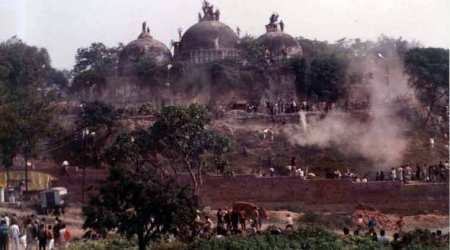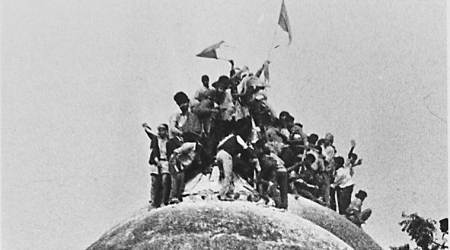 December 5 is the eve of the 25th anniversary of the demolition at the Ayodhya site. (Source: Express/File)
December 5 is the eve of the 25th anniversary of the demolition at the Ayodhya site. (Source: Express/File)
The Supreme Court hearing on the Ram Janmabhoomi-Babri Masjid issue will have to wait three more months since relevant documents in the case have still not been translated into English. On Friday, a three-judge bench of the court, headed by Justice Dipak Misra, fixed December 5 — eve of the 25th anniversary of the demolition at the Ayodhya site — for hearing cross-appeals challenging the September 2010 judgement of the Allahabad High Court which divided the 2.77 acre disputed land between the deity Ramlalla, Sunni Wakf Board and Nirmohi Akhara.
The bench, which also comprised Justices Ashok Bhushan and S Abdul Nazeer, fixed the date after Additional Solicitor General Tushar Mehta, appearing for Uttar Pradesh, and the state’s Advocate General Raghavendra Singh agreed to get nearly 90,000 pages of oral evidence translated so as to expedite the hearing. The bench gave the UP government ten weeks to complete this and directed it to supply hard-bound copies to the appellants.
The court also directed that the appellants and respondents shall translate the 533 documentary exhibits running into nearly 9,000 pages.
Initially as the question of translation of the voluminous case records came up, the UP government pushed for an early hearing as seven years had passed since the Allahabad High Court verdict and said it will need only four weeks to translate the documents it was relying on. “I know what documents I have to rely on and I will get them translated,” Mehta said.
This was opposed by senior counsel Kapil Sibal, Rajeev Dhawan and Anup Chaudhary, appearing for the Sunni Wakf Board, one of the parties to the dispute. They contented that the records had arrived late and they were not expecting the hearing to happen now. It had come up now only because BJP leader Subramanian Swamy had filed an interlocutory application in the matter to enforce his right to worship in Ayodhya, Chaudhary said.
Some respondents in the case had not even been served notices as those who died were yet to be substituted with their legal representatives, they said, and pointed out the the Supreme Court Registry too had given report that the translations were not complete.
At this point, Justice Misra suggested that both sides translate documents on which they wanted to rely on and in case of a dispute, it could be referred to an “expert committee”.
But the appellant counsel maintained their stand and said such practice was unheard of and suggested that the documents should be translated by an external agency. When Sibal pointed out that “Government of India has a translation department”, Justice Misra said “let’s not involve the Government of India in this”.

